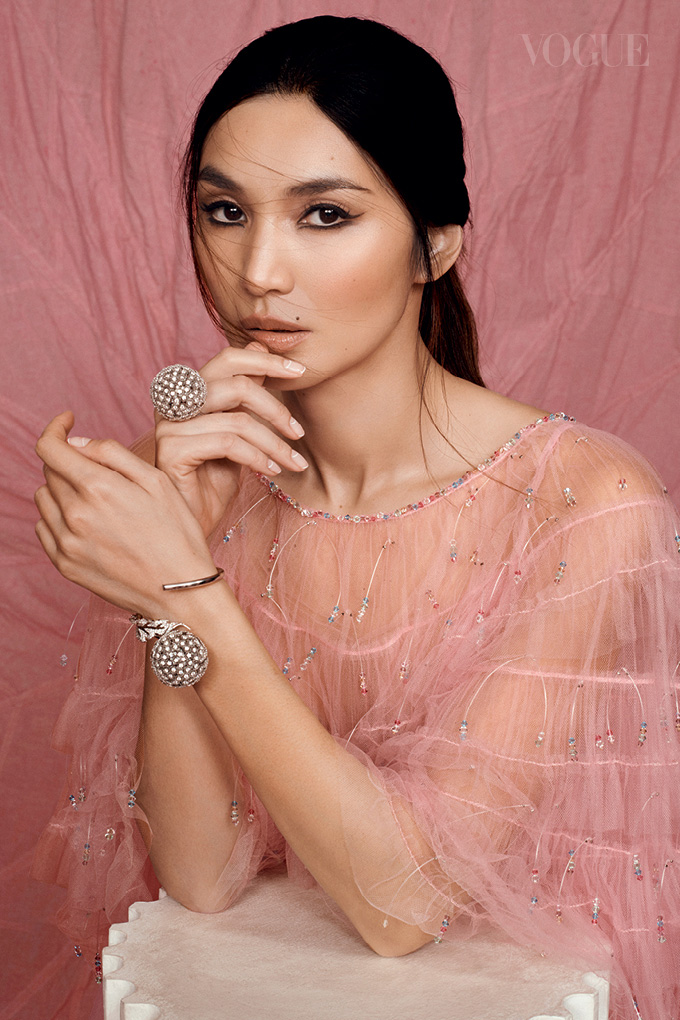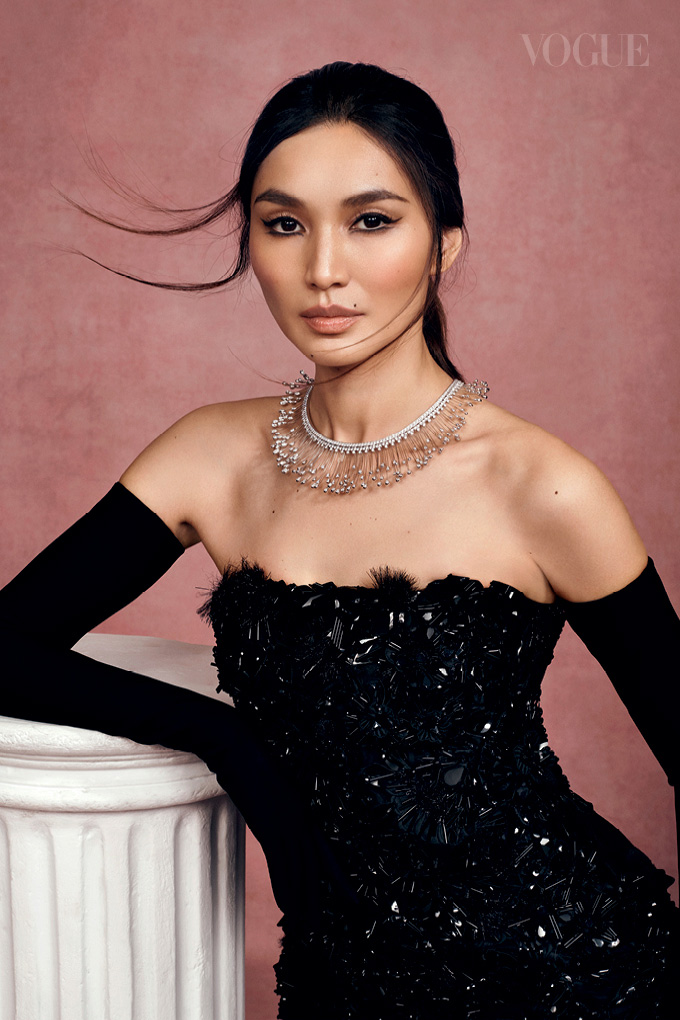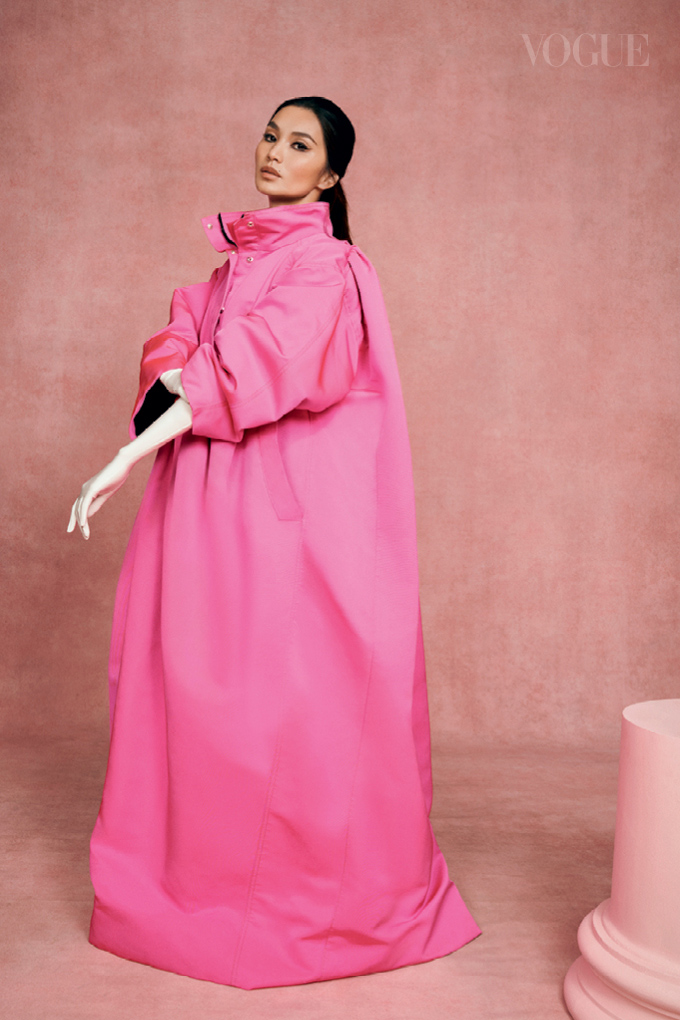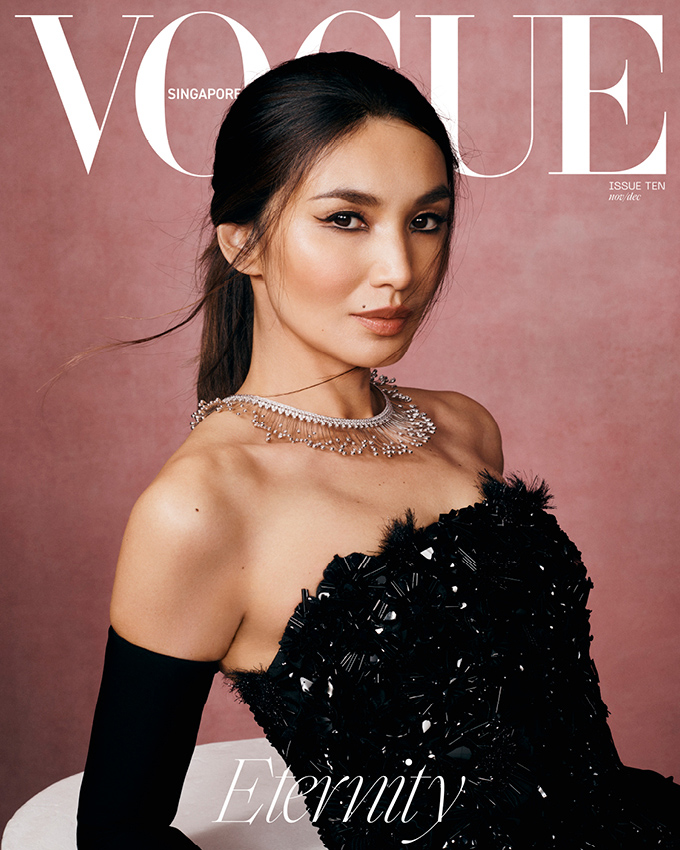In her latest movie, Eternals, Gemma Chan plays Sersi, an empath, who has an affinity with humans. In reality, particularly on our late-night Zoom call, this kinship with people comes to light in her own life. The 38-year-old speaks with natural grace, her soothing British accent is one that will put you at ease. She is apologetic about being 15 minutes late to our call due to her Internet connection and asks how I am doing. I tell her I’m about to have a baby in less than 48 hours’ time and she beams, wanting to know if it is my first or second child. She is contemplative and heartfelt in her responses to my questions and is especially impassioned when speaking about causes that are meaningful to her: the East and Southeast Asian (ESEA) community, girls’ education, male violence and climate change.

and ring Liz Collins
Earlier this year, during the anti-Asian attacks related to discrimination and COVID-19 in the UK, she shared numerous Instagram Stories, lending her support for the lives of people of ESEA heritage in London. Perched in her kitchen, with dappled sunlight streaming in behind her, she explains: “I want the ESEA community to feel seen and valued, and to be able to advocate for itself. And if I can help in any way just to boost or amplify someone else’s voice, I’m happy to do that.”
Even though she had roles in the 2016 fantasy film Fantastic Beasts and Where to Find Them, 2017 sci-fi action film Transformers: The Last Knight, and 2015-2018 sci-fi television series Humans, it was only with Crazy Rich Asians that Chan’s popularity soared overnight. In the minds of most, she is cemented as the impeccably sophisticated Astrid Leong, a kind-hearted Singaporean socialite and protagonist Nick Young’s closest cousin.
To the British-Asian actress, filming on our sunny shores will always be an extraordinary experience. “I feel lucky to be part of that film with my castmates and crew. Embracing the food at hawker centres and seeing all these incredible places—like Marina Bay Sands—in real life was amazing,” Chan enthuses. She laughs when asked about how the Crazy Rich Asians cast are still very much in contact via an active WhatsApp group chat. “There’s the occasional meme that usually comes from Jimmy O Yang. Ronny [Chieng] loves a meme as well. If any of us are in the same city, we’ll meet up for dim sum or noodles and send a picture to the rest of the group.”

I’ve always felt that the near-perfect Astrid was more wonderfully complex than she let on—and it unravelled towards the end of the movie when she broke off with her cheating husband. There was also an Easter egg during the credits when viewers had hints of what might happen next with Astrid’s love life. It is the messy women that attract her, the erudite Chan reveals, and it is in playing the roles of multidimensional, layered women that leave her eager about her next project.
But for now, as the year comes to a close, she is ready to take things at a slower pace and appreciate life at its core. Part of that included adopting a rescue cat called Mr Kitty—she visibly lights up upon mentioning his name—whom she describes as feisty but very affectionate. “The pandemic has brought into focus what my priorities are and nothing is more important than health and family. It reaffirmed those things for me. I’m used to running full steam ahead with everything and it is not a bad thing to slow down for a bit.”
How would you describe the year that has gone by?
It has been a year of upheaval and uncertainty for me as it has been for everybody. I feel very, very fortunate in the grand scheme of things because my family has their health. Now, everything has opened up in the UK and things are getting back to half-normality—but what is normal anymore? Most of us feel a bit of dread, since no one really knows what’s going to happen next, as the weather turns colder. It’s a strange time.
I’ve been going out a lot less and having smaller gatherings at home instead, and I’m really happy just hanging out and looking after Mr Kitty. I’ve also been able to work quite a bit, so I can’t complain about too many things.
Speaking of work, what can you tell us about Eternals?
Eternals is an epic film and it’s incredibly ambitious. It spans the course of 7,000 years and there are 12 characters being introduced. I think it’s shot beautifully and will look and feel very different from other films in the Marvel Cinematic Universe. It’s a bit of a jump from what Marvel has done before and I really hope people enjoy it.

Your character in the film, Sersi, is an empath. Do you identify with her in any way?
I feel like the cast was chosen specially because we had some kind of crossover with the characters we are playing, so yes, I certainly relate to her. She’s probably not the best fighter, but she has this connection with humans and loves living among them. She is a free spirit as well, which I identify with.
Does the shift in Asian representation on screen in the last few years surprise you? From Asian actors previously filling out smaller parts to actors like yourself now taking on major roles—what do you think propelled this change?
I’m not surprised, but I didn’t think that this change would happen within the span of my working life. Things have improved in many ways and quite rapidly, although I think there is a lot we need to do to ensure this is not just a trend or a moment, but change that lasts. I mean this in terms of better representation across the board, whether you are talking about race, ethnicity, disability or all kinds of groups that have been marginalised and not had the chance to tell their own stories.
What is finally sinking in is that representation shouldn’t be tokenistic. It’s not for the sake of it and it’s not box-ticking, but it enhances storytelling and makes it more authentic. People are also understanding now that stories can be universal and don’t just appeal to the people depicted in them. In the past, I’m sure that the received wisdom in Hollywood was that if a film didn’t have central characters who were Caucasian, Caucasian audiences wouldn’t respond. But we have found that to be untrue. I’m optimistic for the future.

What else do you think needs to happen in terms of improving representation in Hollywood?
I do think we need to do more work structurally. There are still very few women and minorities in gatekeeping positions, and there are very few people who can get projects greenlit in Hollywood. The power is still very concentrated in a small number of hands.
The thing that’s been lovely is finding a community of artists who all support one another. And I really feel that within the Asian community; there’s a lot of mutual support between actors, directors, writers for each other’s projects, whether we’re in them or not.
What was it like growing up in the UK as a British-born Chinese?
I grew up feeling both very connected to my Chinese heritage and very anglicised. We were one of the few Asian families in the area. It was only once I’d finished university that I felt a connection to the wider British-Asian community, and it was through my work that I managed to meet other Asian writers, directors and artists. I think that’s something other people in the diaspora can identify with, if you’ve grown up quite isolated from people who look like you. My family was always proud of our heritage—we celebrated Chinese New Year and the rest of it—but it’s hard when you don’t have much extended family around you.
Did you visit Asia much as a child?
The first place I visited in Asia was Hong Kong, which is where my dad and my mum grew up. I don’t even remember the first trip because I was so young—I would have been about two and a half years old. We went back there again when I was 10 and stayed the whole summer. I saw all my cousins and that left an imprint on me—apparently by the end of that trip I was speaking fluent Cantonese. I didn’t manage to visit Singapore until we filmed Crazy Rich Asians, but I loved it there. The people in Singapore were so welcoming and the food was incredible.

You come from quite a traditional Asian family, something most of us here in Singapore can relate to. How do they feel about what you’re doing now?
They’re so proud of me. When I changed career paths and set out to train as an actress, there were very few opportunities in the UK for actors of Asian descent or for Black actors since there were lot of period dramas and not much else being made. So I understand why they were worried that I wouldn’t be able to make a living. Once they knew I was going to be okay, those fears were put aside.
We are not typically told that a career in the arts is viable. Especially in Chinese and Asian cultures, you have that sense of responsibility to your ancestors and parents for all the sacrifices that they have made, so you don’t want to mess it up.
Do traditional Asian values still play a part in your life?
They do in a lot of ways. I feel a deep connection to my ancestors and their sacrifices, and I think it is important to know where you come from and what your family has been through to stay grounded. In terms of Asian culture, the fact that most of my life revolves around food and my work ethic are definitely two things that I got from my mum and dad.

Aside from advocating for the East Asian community, are there any other causes you would like to be a part of in the foreseeable future?
I’m passionate about education, particularly, girls’ education. When girls are educated, they uplift their families and communities, they innovate and do well in business. So finding a way to help improve the educational prospects of girls around the world is important. Equally, we need to focus on how we bring up our boys, how we talk to them, how we raise them. There is a real epidemic of male violence and it’s an issue that we need to address.
I’m an ambassador for UNICEF; they do such amazing work all around the world. I also support Apex for Youth, who do great work with underserved Asian and minority youth in New York. We don’t have anything like that in the UK, so at some point, I would love to help with setting up a mentorship programme. And the climate as well—it’s the most important thing out of everything else, after all.
Photography Liz Collins
Videography Guy Stephens
Styling Konca Aykan
Hair Shon Ju
Make-up Val Garland
Manicure Michelle Class
Photographer’s assistants Teddy Parks and Jordan Lee
Fashion coordinator and first assistant Julia Molnar
Stylist’s assistant Ferhat Rodoplu
Set designer Sean Thomson
Production director Lucy Watson
Producer Meghan O’Donnell
Casting director Jillian Demling/Creative Casting Agency
Additional Reporting Chandreyee Ray
The November/December ‘Eternity’ issue of Vogue Singapore is available for sale online and in-store from 16 November 2021.





